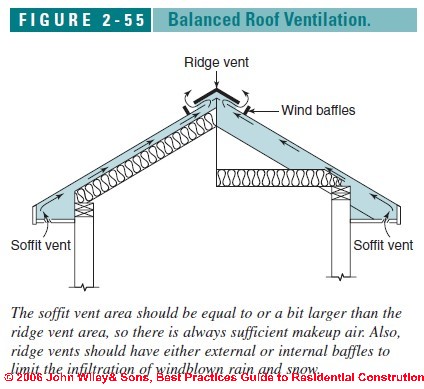The international building code ibc requires that ventilation be provided in all buildings.
Attic ventilation requirements ibc.
21 5 and 387 lineal ft.
Requirements applicable to attic ventilation.
Contributes to but does not supersede thermal resistance requirements for attic and roof assemblies in section c402 2 1 of the international energy conservation code.
The majority of the requirements related to attic ventilation have not changed much from the previous editions.
Exterior openings into the attic space of any building intended for human occupancy shall be protected to prevent the entry of birds squirrels rodents snakes and other similar creatures.
Openings for ventilation having a least dimension of not less than 1 16 inch 1 6 mm and not more than 1 4 inch 6 4 mm shall be permitted.
Building ventilation can be provided through natural or mechanical means.
The ventilation amount and opening size requirements can be found in section 806 roof ventilation of chapter 8 roof ceiling construction.
Insulation requirements for roofs are therefore spread across ibc chapters 12 13 and 15.
Ice dams may be a result of a poorly designed roof a defective attic ventilation system inadequate insulation levels improperly installed insulation or air leaks through the ceiling plane.
Designers may view unvented attic i e.
Openings for ventilation having a least dimension larger.
Attic space enclosed rafter or joist space above normally occupied and conditioned interior space assemblies as an economical arrangement of roofing and insulation materials.
Federal housing authority recommends a minimum of at least 1 square foot of attic ventilation evenly split between intake and exhaust for every 300 square feet of attic floor space.
An ice dam is a ridge of ice that forms at or.
Now we can calculate the ventilation requirements using these products and our example building from before.
Proper attic ventilation consists of a balance between air intake at your eaves soffits or fascias and air exhaust at or near your roof ridge.
The international codes i codes are the widely accepted comprehensive set of model codes used in the us and abroad to help ensure the engineering of safe sustainable affordable and resilient structures.
Another consequence and indication of improper attic ventilation is the formation of ice dams.
The following are the requirements taken directly from the irc.
Mechanical ventilation is typically required in under floor areas bathrooms and some attic spaces.
The roofing industry also has practical guide lines for attic ventilation.
Code requirements the international building code 2012 edition ibc 2012 requires enclosed attics and enclosed rafter spaces formed where ceilings are applied directly to the underside of roof framing to have cross.

